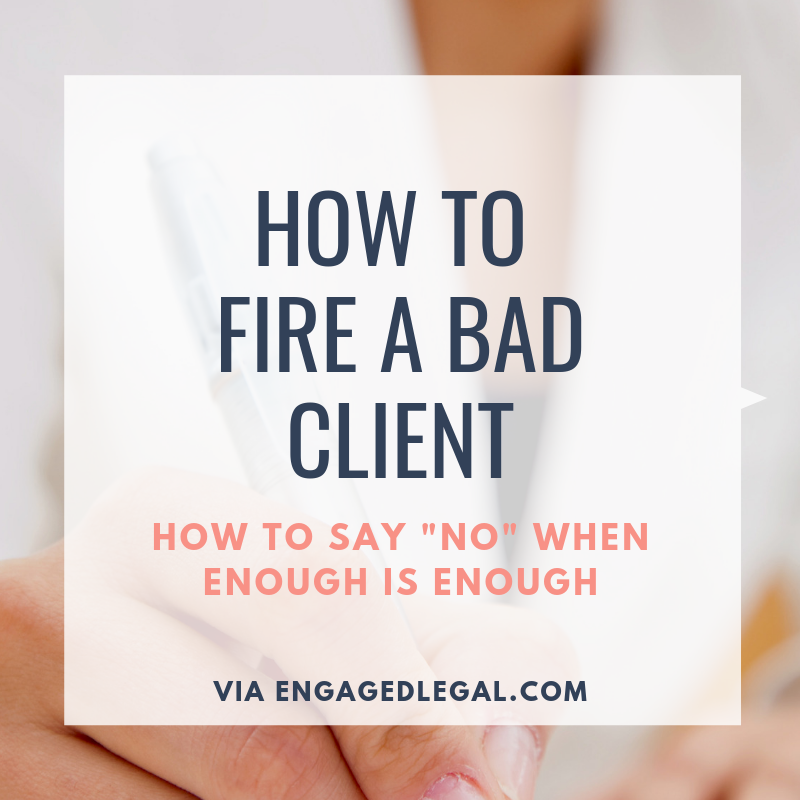How Do I Fire a Client?
/We’re talking that nightmare scenario: firing clients.
You know those clients I’m talking about. The ones who call at all hours of the night. The ones who are never satisfied. The ones who are sucking your soul dry and whose phone calls you let go to voicemail.
The ones who have made you doubt yourself, your passion, and your business.
This is the time of the year when my “dayjob” gets a lot of calls about terminating contracts with clients, aka firing clients. Cancelling client contracts. Getting rid of those couples who are asking for more, more, more.
No one wants to do this. But sometimes, you have to.
But how do you fire a client without getting sued? OR without getting bombarded by terrible reviews?
Let’s talk it through.
The best offense is a good defense.
Woooo sports! JK I have no idea what I am talking about. I cheered in college.
Anyway, the best way to make sure you’re protect is— say it with me— having a strong contract. Make sure you have thought through the end of a client relationship before you sign a contract!
Does your contract detail what happens if the client fires you? What about if you fire the client? When can you fire the client? What if the event gets moved? What if they stop paying you? Who keeps the nonrefundable deposit? What if the venue burns down?! (Tip: our templates do. Just sayin.")
Get this all in writing on the front end to make dealing with firing a client less of a hurricane and more of a subtle breeze.
Read your contract. CLOSELY.
You need to be intimately familiar with your contract. Each scenario I mentioned above needs to have a specific answer that is crystal clear.
Especially that part about the nonrefundable deposit.
So get cozy and pull out that bad boy! You should be looking for a section titled “termination,” “cancellation,” or something of that nature. Read and write out the circumstances under which they can fire you, and you can fire them.
If you don’t have a situation built in where you can fire the client, you need to call a lawyer. You’re going to have to get very thoughtful/ creative about how you get rid of this client. There may be huge repercussions for simply saying “I’m out” without a contractually sound reason.
How to give them Notice
No, I’m not talking about that “it’s not you, it’s me” talk. There should be some sort of clause in your contract about “Notice” and how/ where “Notice” should be sent.
“Notice,” in legal language, is how you officially communicate about the contract. There should be an address or a direction to send something “certified mail, return receipt requested” or something using that language. Or maybe it just says that you can send notice by email. It all depends on your particular contract.
No notice provision? You can probably send notice the way you sent the contract itself— e.g. via email, Honeybook, etc. However, I like to follow up with a printed copy to their address with “Return Receipt Requested” at the post office to make sure we have record of them getting it.
Notice is extremely important. Without giving proper notice, the couple can say “we never got that.” Pair that with you thinking you effectively fired a client, you not showing up at the event, and then them suing you because you didn’t perform, and it’s all-out pandemonium.
So make sure you’re giving notice correctly, according you your contract!
Put Your Big Girl/ Boy Panties On
Ok. This is the hard part. How do you tell a client— even one who is sucking you dry— that you have to cut ties?
What if they yell at you?
What if they leave you a bad review?
What if they say you’re a horrible person?
This is the hard part of running a business. This is where the rubber meets the road. And it sucks— there’s no two ways about it.
No one said this would be easy. In fact, if anything, people probably warned you that it would be tough. And getting the chutzpah together to call a client and explain that you’re just not a good fit is really, really intimidating. But you’ve got to do it. And you’ve got to do it yourself (unless you’re hiding a PR team up that bell sleeve).
You’re the CEO. You’re the PR person. Heck, you’re probably even the janitor some days. And you’ve got to do the damage control here.
That involves being the one who makes the tough calls— so set up a time to walk through this with them.
Plan your exit route
Write up your conversation. I’m serious.
Write out what you want to say. Keep it calm, cool, and very fact-based. Sympathize with the fact that this sucks, but don’t keep apologizing. Look at your contract and explain how you’ve done X, Y, and Z, but it doesn’t seem like you’re a match for what that client needs.
In this case, keep it short, simple, and firm.
This will absolutely involve falling on your sword a bit, being humbled, and feeling like you’re admitting you couldn’t handle things. And who wants to do that?! After all, it’s their fault they didn’t read your contract, expect 800 revisions of a seating chart, or want a free engagement session 6 hours away.
The last thing you want to do is fire a client who just really is a jerk, and give them back a deposit. 🙅♀️
But really, you’re not admitting defeat. You’re pointing out the discrepancies in what was promised and what they expected— and why you can’t deliver it— saving your business in the meantime.
Provide an alternative
If you’re jettisoning someone, it might be a gesture of goodwill to provide the names of other businesses who may be a good fit. Don’t throw your friendors to the wolves here, but refer folks if they would be a good match.
Get it in WRITING.
Before you refund, terminate, or do anything, GET IT IN WRITING.
This is also where I like to insert a mutual non-disparagement clause saying neither of you will talk bad about each other on social media/ write bad reviews on WeddingWire or encourage others to talk badly about each other.
You can’t put this in the initial contract (it’s not enforceable) BUT It’s totally acceptable in a settlement.
This is the time when you really should bring in a lawyer.
As soon as they sign a settlement, they can get a refund and this will get tied up with a nice little bow without worrying about getting 1000 bad reviews from the bride’s great aunt Sheila. 🎀 It’s worth the lawyer fees for an enforceable settlement.
Learn from it.
Every client is a chance to learn, especially clients who don’t work out. What were the warning signs? What could you have done differently? These are the things that you literally cannot learn without experiencing them— so take every experience with a dash of gratitude. Next time, you’ll be able to better identify the clients who will cause issues— and avoid them completely.



















